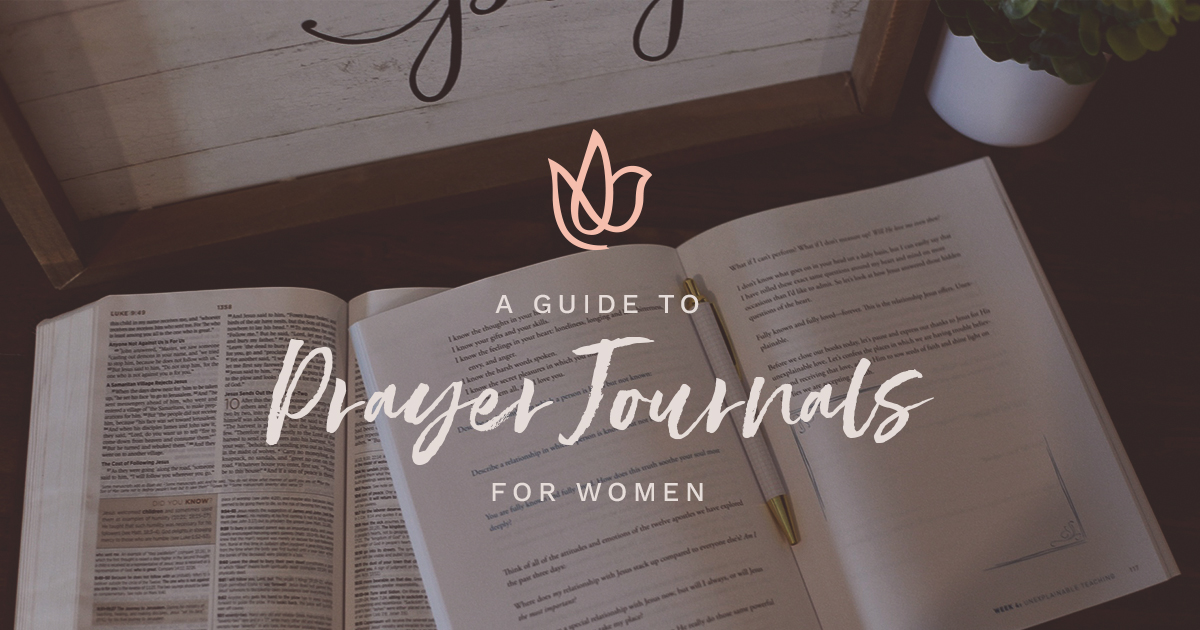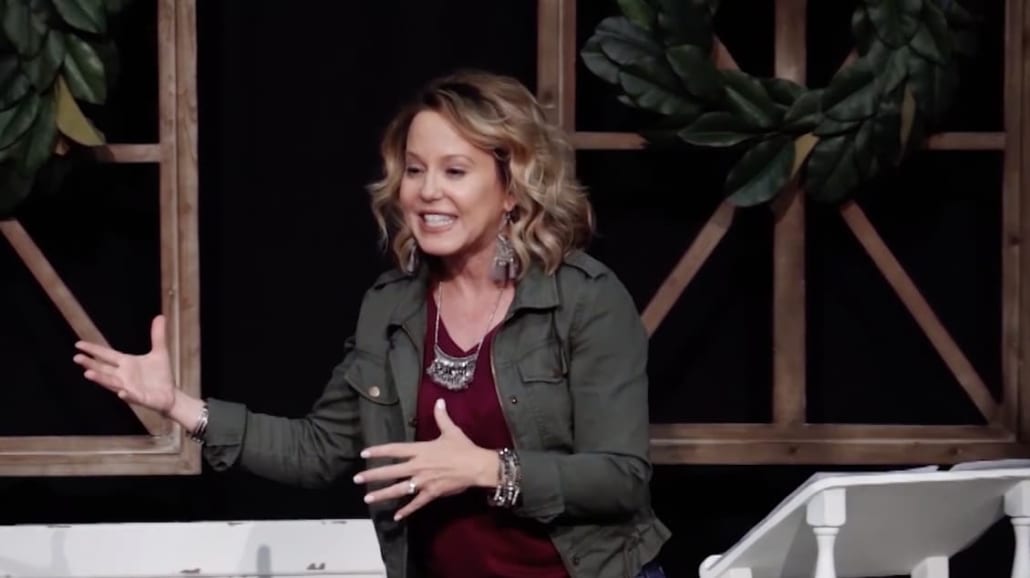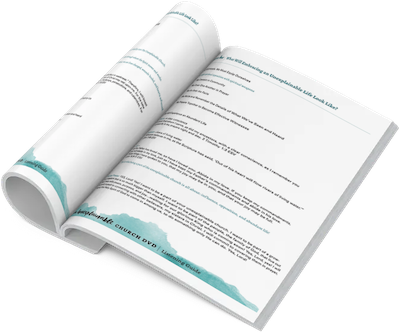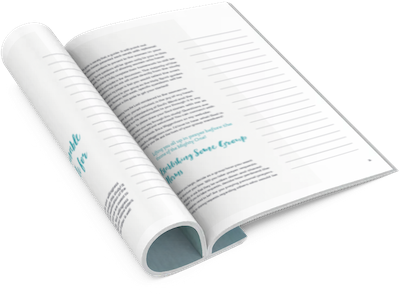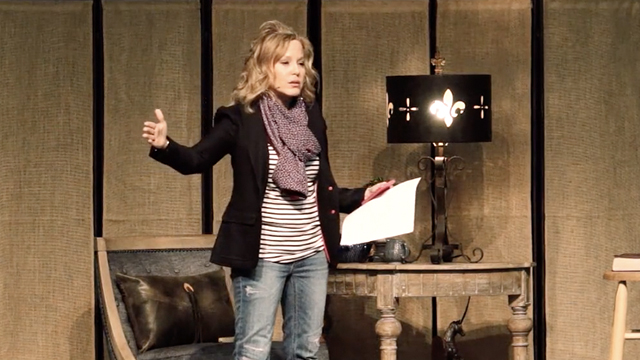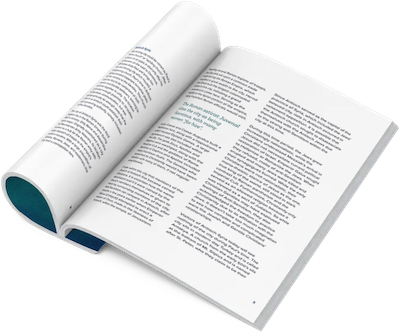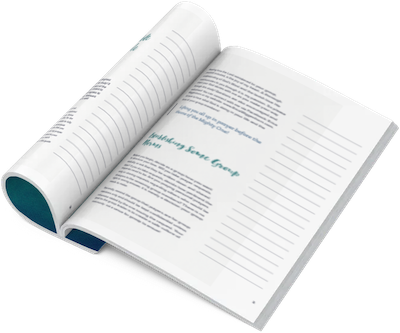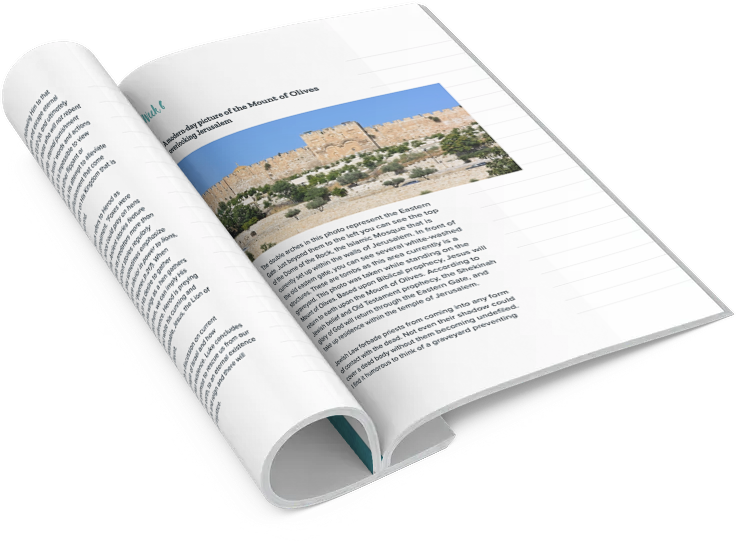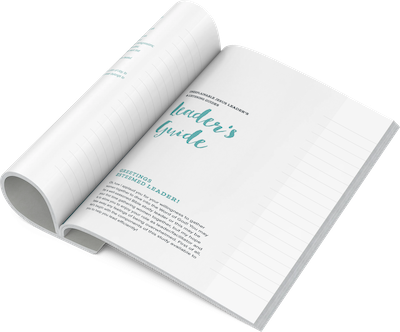Prayer journals for women have grown in popularity over the past few years. I believe I know why women gravitate to prayer journals so readily. For seven years of my life, I met weekly with the Bravo Team for dinner. We coined that name for our foursome because we ate at Bravo, and our purpose in gathering was to cheer one another on in life. The conversations varied widely, some tearful, others contemplative, at times full of laughter and other times silence as we sat together in grief. There were no rules. No agenda. Just raw emotions and honest questions. A reminder that somebody’s got your back and willing to bend their knees on your behalf.
Prayer journals are a lot like the Bravo Team. They foster connections and conversations that can include every human emotion and condition. It’s not a script from which you cannot swerve. Nothing is taboo. They are simply a tool for conversation and connection with God Himself, Who engages throughout Scripture with humanity expressing every emotion possible.

For most of us, though, we don’t know how to talk to God the way we do with good friends who seem to get us. We might wrestle over what is safe to say and wonder if God can truly understand the plight of the human condition.
Does He really get us?
Or is He truly intent on intervening in our lives and helping us process our emotions?
Can we pour out our complaints to God, or is that off-putting to Him?
In all of these questions, prayer journals provide permission to broach topics with God we might not feel comfortable with otherwise.
Prayer journals can also provide focus for us, varying how we pray and what topics we cover. Most of us live fast-paced lives with constant noise and responsibilities pulling at us. Having a framework in front of us resets our thoughts when we start to wander in prayer. It gives us a goal so we feel good about our growth and helps us develop habits of connection.
But any routine can grow stale.
Prayer journals also teach us different ways to pray and expose us to various types of prayer in the Bible. Much like going to the gym for forty-five days without ever varying your workout routine, prayer journals provide fresh ways to enjoy your relationship with God and strengthen spiritual muscles you may not normally exercise.
As a Bible study author, I find the most valuable prayer journals start with Scripture. They show me real people with real problems coming before a very real and present God in the Bible.
We see humans wrestling before Him, begging for help. We find doubters, sinners, and saints all asking the same kinds of questions. And we see God answer. And heal, guide, protect, and restore. We hear Him explain and exhort us to believe in His goodness. In essence, we see a conversation between the Creator and His beloved creatures, inviting closeness. So, my personal preference when it comes to prayer journals is Bible studies with prayer journaling components.
Some women’s Bible studies and prayer journals can focus on particular topics or seasons of life, such as loss, grief, a health crisis, or preparing to send your child to college. The prompts center around the circumstance and enable you to process the many questions and emotions faced. Prayer journals for graduates, mothers-to-be, and newlyweds celebrate the changing seasons of life.
Some of my favorite topical prayer journals are below, with links to purchase.
General Prayer Journals for Women
Other prayer journals provide an organizational structure to help keep you focused and intentional in covering those you love in prayer. They include space for you to remember missionaries, government leaders, church family members as well as those in your immediate circle with whom you rub shoulders daily. These journals are especially helpful in expanding prayer beyond our own immediate concerns and growing in the practice of intercession.
These resources can serve as excellent tools for family prayer time during meals or at the end of the day. Small group leaders and Sunday school teachers can utilize these journals to broaden the scope of prayer time in their gatherings as well as keep track of various requests.
For those who are creative, coloring prayer journals provide support to sit and be still while your mind sits in silence and you talk to God. Creating something beautiful mimics our Creator and allows you to connect with Him in the stillness. Some Bibles even offer this feature.
For those on a budget, a simple spiral notebook with a date at the top and your thoughts on the college-ruled lines can serve as a prayer journal. You can look back at your questions and requests and record how God answered and provided clarity.
For years I wrote out Psalms on the left side of the notebook and then echoed my thoughts in response on the right. Writing Scripture out forced my mind to slow down and focus and through the words of David, I learned how to praise, petition, pour out my pleas, lament my losses and come before God with raw fear and open honesty. David, the man after God’s own heart, taught me that I could come before God with anything: my deepest sin and my most secret desires. He was my safe place in all things.
So whether you need to grow in your understanding of prayer, develop a daily habit of prayer, process a certain season or emotion, find a way to organize yourself, or simply learn to be more still, prayer journals can provide the resources and tools you need.
In this article, we’ll look at types of prayers in the Bible, structures and frameworks for prayer, Bible studies and devotionals on prayer, cautions in using prayer journals, and free downloadable templates for prayer journals.

How to Talk to God: Simple Journal Prompts
Download this FREE resource with journal prompts to connect in fresh ways with God through prayer.
Praying Women In the Bible
Full disclosure, I am a Bible study author and nerd, so when it comes to bible, prayer, or devotional journals, my favorites keep the Word of God as their foundation.
But the deeper comfort in launching my own prayers after surveying those in Scripture comes from the commonality of experience.
Many of these prayers come from hearts aching with despair or flooded with doubt. They remain discouraged despite their faith. They face fear of the unknown and plights of poverty and tragedy. And when they pray, God meets them there. Not because of their piety but because of their purity- an honest confession that God is their only hope and strength.
Nothing within them remains equipped to face the circumstances with any real solutions. God alone must intervene.
If you are anything like me, there are many times you end your prayer time without any definitive answers.
God didn’t show up in a burning bush and spell out a game plan. No hand appeared, and wrote your next steps on the wall. You are still left wondering and waiting to see how God will work things out. And fear still niggles at the back of your neck, anxiety in the recesses of your mind, or despair in the caverns of your heart.
Just like the women of the Bible who prayed.
And we can trust that the God who met them and cared for them, in spite of their struggle to trust and believe, will meet us too.
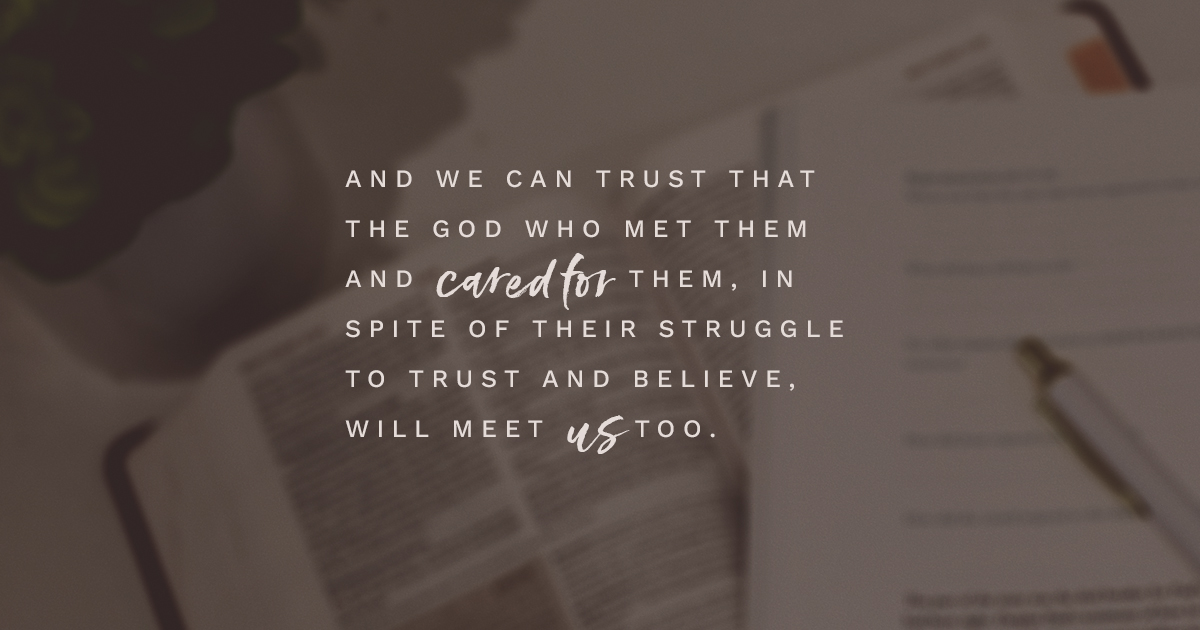
A solid understanding of these stories will help us navigate the swath of suggestions on the best type of prayer journal because it will show us where we need the most help growing in prayer ourselves.
Hagar
One of my first and favorite prayers in the Bible comes from Hagar. A slave girl who bore Ishmael to Abraham, she remained an outcast from the beginning. The favored wife of Abraham, Sarah, hated her. Sarah remained barren while Hagar had borne Abraham’s only son. Ironically, the whole arrangement had been Sarah’s idea.
However, Hagar gloated about her pregnancy, causing Sarah to deal harshly with her so she ran away.
Upon fleeing the Angel of the LORD meets Hagar and affirms “the LORD has listened to your affliction,” Genesis 16:11 ESV. We know that Hagar understood for she responded with the words, “You are a God of seeing…truly I have seen here him who looks after me,” Genesis 16:13 ESV. Even when some of my affliction was caused by my own doing, Hagar reminds me that God looks after me nonetheless.
Deborah
Deborah stands as a woman of strength who rises in faith despite the passivity of male leadership around her.
Whether in our homes, churches or workplaces, go-getter girls can feel frustrated by their inability to be able to take charge due to traditional societal structures. Deborah serves as a model of humility despite her strong leadership skills.
When Barak remained too timid to fight on behalf of Israel, Deborah encouraged him and accompanied him on his mission. When God granted the success He had promised, Deborah gave all glory to God in Judges 5.
As women, we especially run into this issue in our homes when it comes to our children. We may feel frustrated that our spouses are too passive in fighting for our children. Or we may feel passed over or not taken seriously at work because we are female.
Deborah shows us that we can and should speak up after praying to the LORD and seeking His counsel.
Hannah
After personally battling barrenness for decades, Hannah’s prayer especially hits home for me. But the longings Hannah expresses in her prayer can be applied to all sorts of longing.
Whether it is for a child to be healed or helped, an unfulfilled dream, or overcoming loss, Hannah’s desperation might be experienced in varying circumstances.
Hannah wept and would not eat. Her husband Elkanah took her grief personally, asking her to cheer herself, which must have felt excruciatingly impossible. (See I Samuel 1:5-8.) .
Those who carry the weight of grief know it is a cloak much too heavy to simply shake off. Despite Hannah’s deep faith, grief enveloped her, causing her to withdraw.
Esther
Esther’s prayer comes from a place of great courage and unwanted responsibility.
The fate of her entire nation lies in her hands. Without her intervention, her people face extermination. She called upon her people to fast for three days in preparation for her to make a courageous move and approach the king, thereby risking death.
We may not be facing a life or death situation, or we may very well be, but often we find ourselves in circumstances where we lack the courage to speak our mind or make our next move.
We feel paralyzed by fear or unsure of what to do.
Mary
The last prayer comes from Mary, the mother of Jesus, who, in a prayer of obedience, surrenders to this confusing call of God upon her life to bear the Son of God! Talk about feeling alone!
There is literally not a soul on earth with whom she could share this experience. No one. A young girl, confused and put in a potentially life-threatening situation due to an unexplainable pregnancy, instead of crying in her confusion, she worships in resolute surrender to God’s plans.
None of these women held all of the answers or lived easy lives. The one thing they had in common involved prayer. They turned to God for help and answers in the middle of the fear, confusion, and grief. They did not hide their emotions or mask their neediness. Instead, they came bare before a God eager to cover them in His love and power.
Why Prayer Journals Are Effective for Women
Women have cried out to God in prayer for millennia seeking solutions, strength, and sustenance. Women came empty of answers and devoid of anything to offer beyond their cries and questions. They didn’t get their life together first or work through a series of rituals in order to approach God in prayer. They came just as they were in all of their messiness.
Prayer Journals show us the approachability of God. He invites us to bring our needs to Him. Out of love and compassion, He hears our pleas and performs wonders on our behalf.
As a Bible teacher and Bible study author I meet countless women who feel uncomfortable praying out loud. And when they pray in their mind, their thoughts wander.
I totally get it.
Staying focused and being transparent without worrying about how we sound brings greater closeness to God.
Have you ever had a person in your life with whom you always felt you had to carefully weigh your words before speaking them out loud?
Maybe they had a tendency to twist what you said and use it against you.
Maybe they criticized your speech and made you feel dumb.
Maybe it is simply hard for you to think and speak out loud at the same time.
Prayer journals provide a safe space to unleash your emotions and unload your questions before a tender and ever-present Father ready and waiting to offer His wisdom.
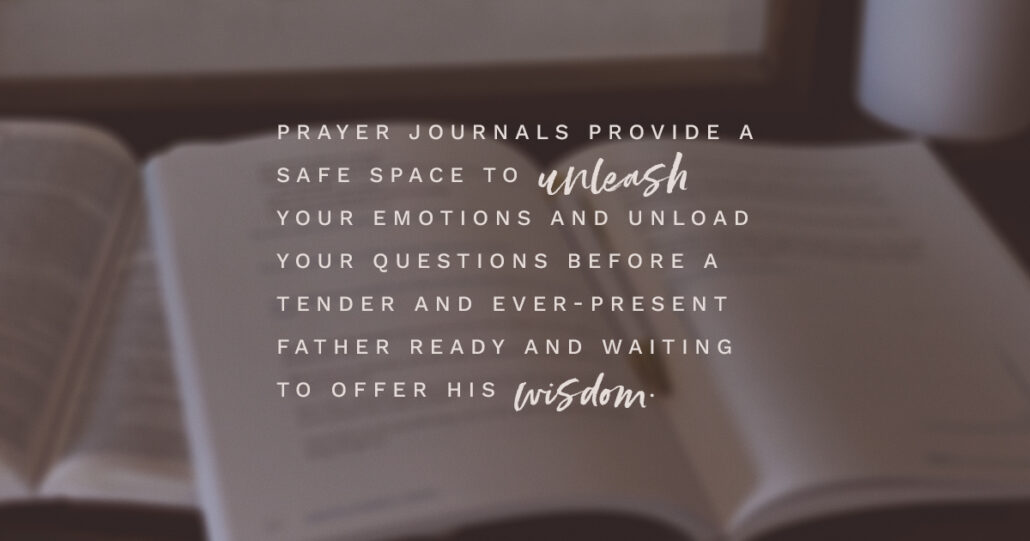
Prayer journals can also create a consistency to our conversations with God and give us permission to be vulnerable. Some prayer prompts may provide permission to talk to God about things we may otherwise feel might be off-limits to bring before a Sovereign God. After all, we might reason, it wouldn’t be right to complain to Him! But what we see is that God desires our transparency rather than a false piety. He knows the longing of our heart even when we may never voice it. And He desires for us to talk to Him about it so that He can bring His perspective to it.
When we cannot trace His hand, He wants us to trust His heart. There are reasons beyond what we can see. And things being accomplished we cannot calculate. Prayer journals invite us to be God-centered in our prayers and focus on the vastness of our God in comparison to the finiteness of our problem.
Cautions About Prayer Journals
Prayer journals are one means of fostering your relationship with God.
As I mentioned previously, as a Bible study author, I often include written out prayers within my Bible study book or even in my Bible itself. I will often date the front of the study or add the date of when I scrawled the prayer in my Bible. Over the years, I often remember the circumstances of my life with what section of Scripture I studied during that time. It always amazes me the parallels that I find in the ancient text and my personal modern day problems!
The thought to keep in mind is that prayer journals are a tool, not a command. Yes, we are to pray. Scripture repeatedly commands us to do so. But prayer can happen in many forms outside of a specific prayer journal.
I have found one of the greatest benefits of prayer journals is that they record the history of your relationship with God. To go back and revisit seasons of your life and reread your prayers allows you to see how your faith and obedience have grown over time.
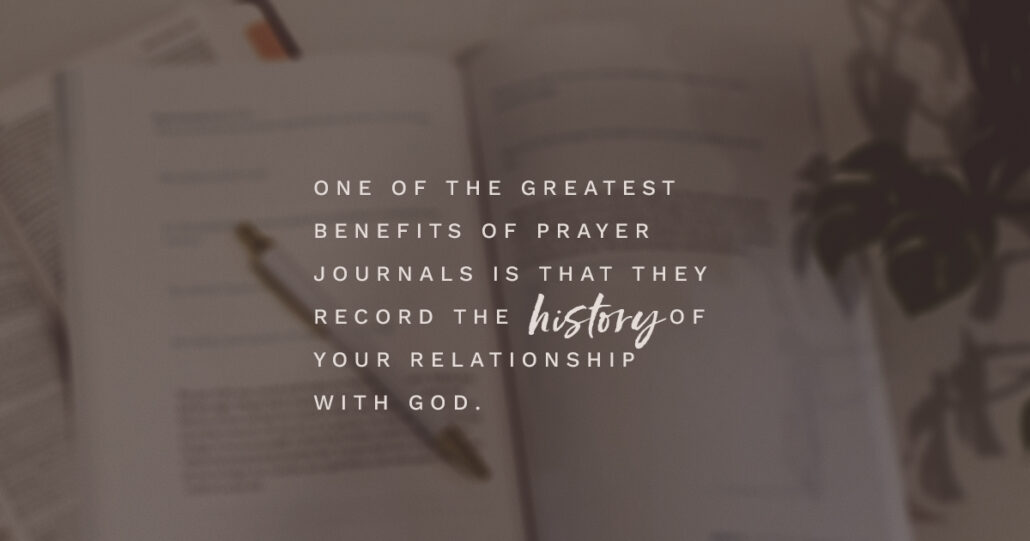
You can also see the many prayers God answered over the years as well as understand the benevolence of His silence regarding some of your requests. Some of God’s “No’s” most likely turned out to be some of His best “yeses”. Sadly I wish I had kept my prayer journals through my various moves across the country, as now that I am older, I imagine my children would enjoy reading the prayers I prayed for them over the years!
One type of prayer journal you may never wish to share with others could include a time of deep anger or grief. Some words only God is big enough to handle and they could crush the human spirit. Secure your words from any who may be hurt by them and remember that ultimately a prayer journal is a dialogue between you and God.
Which leads to the final caution.
Often in prayer journals, we are talking to God. But we also need to learn to listen to God. And God most readily speaks through His Word, the Bible.
We should never read our Bible without reflecting upon what it says, nor should we ever spend all of our time talking to God in our prayer journal without also inviting Him to speak to us in His Word.
As in all conversations, there is a time to talk and a time to listen.
Women’s Prayer Journals Versus Devotionals for Women
Oftentimes prayer journals are coupled with devotionals. This type of prayer journal generally invites you to respond In prayer in relation to the topic addressed in the devotional or the theme verse(s) presented. This is one type of prayer journal and can serve as a wonderful way to begin growing in your prayer time.
The greater goal of a prayer journal, however, is to free you to bring all of your cares before God and to learn to pray both Scripture and personal concerns.
Imagine the difference in conversation between board members following an agenda versus the Bravo Team I presented in the Introduction. Only coming to God in prayer with scripted responses or specific agendas can end up stifling the conversation. It can also lead to the idea that we can only come to God in response and never initiate conversations with Him ourselves.
God chose to dwell among us. He created the world and us to be with Him in community and relationship. He does not want ritualistic rhetoric. He wants heartfelt communication.

Prayer Journal Format
Prayer Journal formats can come in a variety of forms. We discussed some of them briefly in the introduction.
If prayer journals are a newer concept for you, I would suggest starting with one that includes prompts. This will help you get in the habit of pouring out your thoughts in response to specific questions and concepts.
Kind of like an awkward first date, many people struggle with not knowing what to say or how to begin the conversation. Trying to find commonality with the King of the Universe might feel a bit daunting. Starting with prompts helps get your thoughts going.
Other prayer journals involve certain blocks rather than specific questions. We’ll explore some here.
SOAP
The SOAP method includes four steps.
- Scripture: writing out a specific verse or passage
- Observe: what do you notice? When you slowed down in order to write out the passage, what popped off the page at you?
- Application: How does this promise, principle, or command apply to your own life specifically? What did you sense God teaching you through it?
- Prayer: Pray the Scripture back to God, asking Him to help you apply it to your life.
CATS & ACTS
The CATS & ACTS Methods also include four steps, but you don’t necessarily start with Scripture. These methods train us to focus on God first and then move on to our own needs and desires last.
CATS
- Confession: Talk to God about anything weighing heavy on your heart or where you feel like you are not living up to His expectations of you. Talk to God about any sin you have committed and repent of it, meaning agree with God over its wrong and its negative effects on your life and relationships.
- Adoration: Praise Him for His attributes and His character.
- Thanksgiving: Thank Him for what He has done. Try to be specific here.
- Supplication: Close your time with your specific requests.
ACTS
The same concept as CATS but in a different order.
- Adoration
- Confession
- Thanksgiving
- Supplication
For longer stretches of prayer, such as a day away or a weekend retreat, you can look over the course of a season of life, such as the past month or year, and journal through these four blocks:
- Thanks
- Regret
- Intercession (this is simply a big word that means to pray others’ needs as well as your own)
- Purpose
THE LORD’S PRAYER
Writing out the LORD’s prayer and working through the SOAP method or simply making your own daily application in response to Jesus’ requests in this prayer can serve as a time to repent before God and restore relationships with others.
The beautiful thing about prayer journals is that there aren’t any rules!
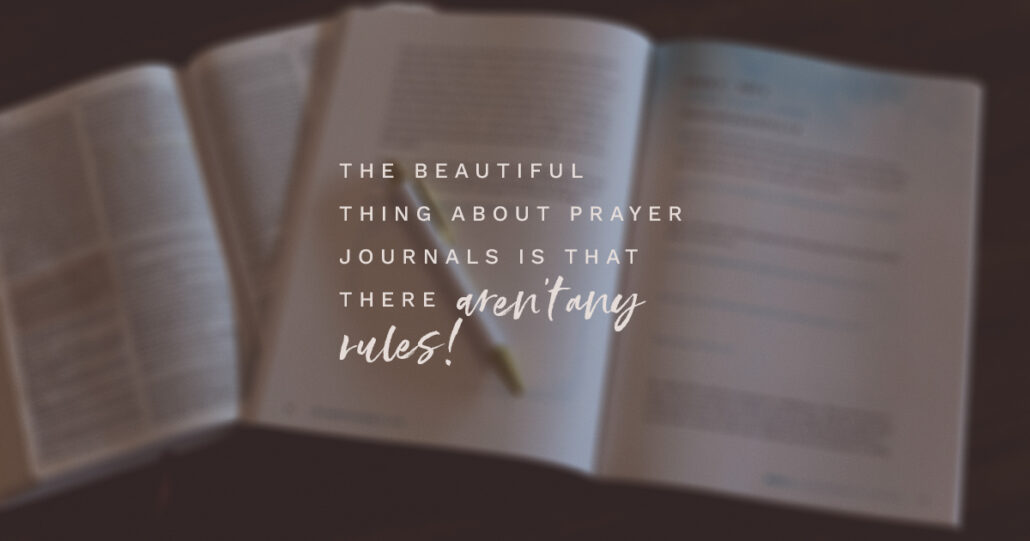
Lots of great suggestions and best practices, but at the end of the day, you can make this time most effective for you during your particular season of life and circumstances.
My Personal Prayer Template
My very first prayer journal involved writing out a Psalm each day and then echoing my own prayer back to God in response to it.
Psalms are simply prayers or songs God’s people wrote and sang to Him for centuries.
While many of the Psalms were written by the priests and used in worship, the vast majority of the Psalms are attributed to King David, many of which he wrote during the darkest moments of his life. I found a pattern in many of them that I adopted for my own prayer journal:
Grievances, Gaze, Goodness & Glory
Grievances
I’m not one to openly share my emotions. I keep them locked up tightly, so when I first encountered David’s rants, I reeled in disbelief.
You could actually tell God you hated people? And ask Him to harm them?
Over time I realized that David was simply unloading his grievances.
He knew God was merciful. He knew he himself was a sinner. He knew he deserved God’s judgment as greatly as anyone. He just needed a safe space to get it all out. And David’s safe place was God.
I’ve learned to make God my safe space, too, and sometimes I have a hissy fit or a pity party. I don’t intend to stay there, I just need to unload it so I stop carrying things I cannot control.
Gaze
Once David unloaded his grievances, he turned his gaze to God.
He intentionally turned away from everything unfair, frightening, and sorrowful and chose to look at God. He didn’t pretend the situation no longer affected him or that he was so spiritual he was indifferent to earthly cares, he simply recognized that he could not allow the situation to consume him. Whatever he chose to gaze upon would grow.
And David teaches us that our problems will present themselves insurmountable if we don’t turn aside and look at God. This point of turning our gaze also involves the recognition that we cannot fix them on our own. We have to go to God for help.
Goodness
Thirdly, I focus on God’s goodness.
David intentionally recounted the gracious and powerful acts of the LORD in times past. Not only in David’s life personally but for His people collectively.
This is where knowing the story of God in the Bible becomes so important.
We become equipped to remember how God behaved in similar circumstances previously and inspired to have confidence in His ability to take care of us now.
History is our greatest teacher, and knowing the works and wonders of God in ancient times boosts our belief in our own era.
Glory
Lastly, we see David surrender to God’s glory.
He realizes that God will use this hardship and difficulty to accomplish something David cannot completely understand but that through it, David will grow to know God more deeply and trust His wisdom and kindness more fully.
This is a step of surrender where we say, “Not my will but yours be done, Father.” It is an acknowledgment that God is love and His acts toward His children are loving even when they do not seem so. He always has a redemptive plan in place.
Suffering never lacks purpose.
Breaking Through The Most Difficult Part of Prayer Journaling: Starting
Personally, I have found that prayer journals are a lot like exercise. I purchase the membership and make a plan but have a hard time showing up consistently! (Am I alone here?!) But just like exercising, even a small amount can go a long way. And when you begin to see results, it increases motivation.
One thing I can promise you: when you make time to connect with God you will see results. Maybe not immediately, but give it a few weeks and even those around you will notice the changes. So don’t give up and don’t beat yourself up when you struggle with consistency. Do what you can when you can and celebrate small successes! God does!
God is honored when you set a plan to spend time with Him. He will not waste whatever time you give Him! But the absolute last thing the enemy of your soul wants to see is a woman with a prayer journal. So once you decide to begin connecting with God in prayer, get ready for the devil to try to distract you!
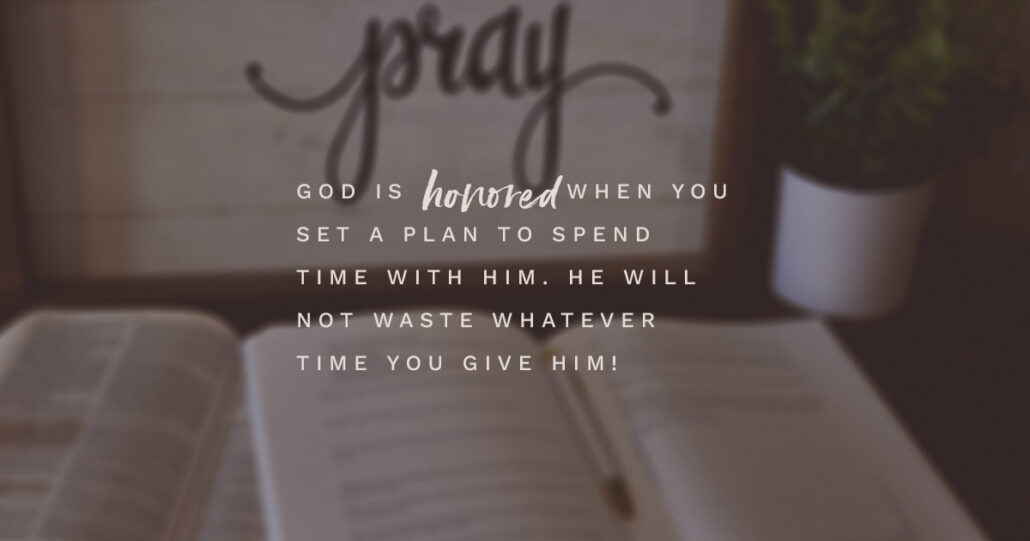
How to Use A Prayer Journal
The devil may tempt you to doubt whether God really hears you. Or to wonder if your prayers make any difference. He may accuse you with feelings of unworthiness to ask for God’s help or criticize you for not staying consistent.
All lies.
God sees us, hears us, and loves us and is always honored to be approached in prayer. As Peter tells us, “Cast all your anxiety on him because he cares for you,” 1 Peter 5:7 NIV.
Another tactic he may try is for you to become overly critical of yourself.
When you fall behind a couple of days he’ll tempt you to throw the practice aside and stop trying to pray altogether. Or he’ll entice you to think that you don’t need to utilize a prayer journal, you can just pray on your own anywhere at any time. Which is true. But he knows that without the structure, you probably won’t.
The devil is helpless against our prayers so he will try anything and everything to get us to stop.
Simply choose a format and try to pick a specific time of day to build consistency.
If you find one particular format especially cumbersome, change it up.
The prayer journal is a tool to connect with God and share your heart. It is meant to facilitate your relationship. Just like you wouldn’t go on a date at a restaurant known to be too loud for conversation, don’t stick with a prayer journal that becomes more of an obstacle than a help to grow in intimacy with God.
We have discussed many different types of prayer journals in this article specifically so that you can find the one(s) that aid you most.
I personally prefer early morning, but if you are a night owl it could be a great end of day activity to help you unwind! Choose a location with minimal distractions and don’t become overly concerned about how much time you spend.
The only focus when it comes to time should include making sure you are intaking Scripture as equally as you are pouring out your heart in prayer!
My Prayer for You, Dear Sister
Dear Jesus,
Help us to remember that you left heaven to come connect with us. Your heart’s desire is to be among Your people. And when we pray we invite a special closeness with you. Your word reminds us to cry out to You with our cares. “Trust in him at all times, you people; pour out your hearts to him, for God is our refuge,” Psalm 62:8 NIV. As we choose to run to You, we know You will meet us in our deepest need. Help us to turn to You again and again for wisdom, strength, guidance and provision.
In Jesus’ Name, amen.
